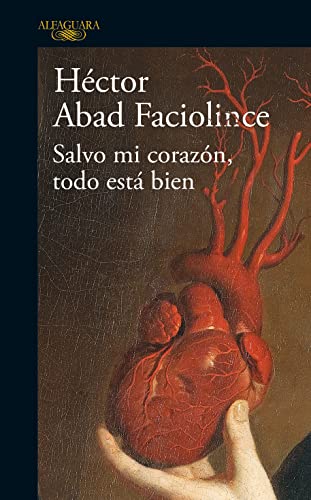Madrid: Alfaguara, 2022. 360 pages.
 A good time to confess your sins might be when you know you’re going to die. That’s what Luis Córdoba would say, the Catholic priest and main character in Héctor Abad Faciolince’s recently published novel, Salvo mi corazón, todo está bien.
A good time to confess your sins might be when you know you’re going to die. That’s what Luis Córdoba would say, the Catholic priest and main character in Héctor Abad Faciolince’s recently published novel, Salvo mi corazón, todo está bien.
Fifty-year-old Father Córdoba has been a devout priest his whole life; he is also an expert in film and opera. He is not a pedophile, but he is a cinephile. Father Córdoba has had a long-term addiction to fine dining, as well. His nickname is “el gordo” and he’s described in the novel as a “buey manso.” The book, whose title is a verse by Colombian poet Eduardo Carranza, begins with a cardiologist telling Father Córdoba that, thanks to his bad diet and lack of exercise, he has a weak heart and needs a transplant. But until the hospital can find a donor, he must move out of his walk-up apartment to a street-level home. By the grace of God, Córdoba has a friend named Teresa, whose husband Joaquín recently left her, and who lives in a ground floor apartment. Father Córdoba moves in with her. While waiting for a donor, he lives a domestic life with Teresa and her two children. The housekeeper, Darlis, also lives with them. During this time, he realizes that this is the kind of life he would have liked to have. He would have enjoyed coming home, having dinner with his wife and kids, watching TV together, talking about the news, and working on family projects together. Father Córdoba longs not for sex, but rather for fatherhood.
Joaquín, Teresa’s husband who left her, began dating a younger woman, seduced by her body and ostentatious family fortune. He was bored being happy with Teresa. So, he went looking for adventure in what his young girlfriend could offer: the allure of extravagant parties, extended vacations, and expensive clothes. That type of lifestyle, according to Father Córdoba, is for snobs. While Joaquín lives a new life as a rich man with his girlfriend, Father Córdoba has conversations with this new family. On one occasion, they talk about the existence of God. Father Córdoba, who isn’t interested in theological controversies, confirms that “Bach’s music, his cantatas, or some of Mozart’s melodies, or the existence of human beings like these children, or the beauty of pictures people paint, or verses written by mystics, these show that God exists. That’s enough evidence for me.” On the other hand, when Father Córdoba comes home, all the condiments, bakery, sweets, and anything else that can harm him must be gone, which is why the children of the family insist on praying before dinner: “Bless us, oh Lord, and bless this INCREDIBLY BLAND food we receive from your hands.”
The characters constantly wonder about Catholic priests’ vow of celibacy. The book is replete with literary definitions of the heart. We are also privy to a description of the sides of the heart and how they function in communication with the lungs. We find out that octopuses have three hearts (and earthworms have ten). Remarkably, while writing the novel, Abad Faciolince underwent artery replacement surgery; evidence of an author who is committed to his work.
Salvo mi corazón, todo está bien tells the story of characters who speak to us about what really matters. Their sincerity and generosity stay with us. Let’s keep speaking with them.





